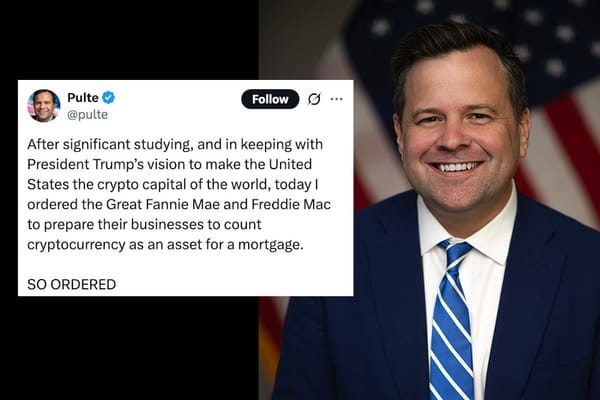Issue 22 – Conferences and collapses
In stark contrast to the prior year's NFT mania, SXSW 2023 showcased a crypto industry made weary by a protracted downturn.

When I emerged from my cave to attend Web Summit last November, FTX collapsed.
With that context, I should have known better than to write in my pre-SXSW newsletter:
I'll be sure to cover everything that happens during that period in the following newsletter edition, and cross my fingers that nothing completely explodes while I'm otherwise engaged.
I'm sure I've just guaranteed it will.
I would just like to apologize to the investors who worked themselves up into hysterics on Twitter as various banks failed or teetered on collapse while I was away.
I'm now also accepting funding offers from people who wish to deploy my apparent powers of destruction by sending me to other conferences.
You can read more about the recent failure of Silicon Valley Bank, and what it should tell us about venture capitalists, in my most recent essay. I also have a work in progress about the collapse of the crypto-friendly Silvergate and Signature banks, but I wanted to get this recap out before I fell too much more than a week behind.
One other programming note: I have just discovered a way in which I can make this newsletter effectively pay-what-you-want, which is the system I really would have preferred all along. If you're interested in supporting the newsletter but the previous price was too steep, or if you're already a supporter and you want to adjust your payment amount, go take a look! It's janky, but it gets the job done.
If you're already a monthly paying subscriber, you don't have to change anything unless you want to — the pledge amount you signed up for will remain the same unless you decide to change it.
The SXSW recap
As many of you know, I was away in Austin last week at South by Southwest. I had a great time, and enjoyed the opportunity to meet a few folks I had only corresponded with online, spend some time with longtime wiki-friends I see only rarely, eat my own body weight in tacos and barbecue, and of course attend various panels and sessions. I also presented a featured session on the 14th, titled "Popping the Web3 Bubble". I'm hoping they'll send me the video recording so I can publish it — I filled out the form to ask them too, at least, so we'll see — but in the meantime here's a thread of video clips by the lovely Steven Monacelli if that interests you:
The crypto vibe at SXSW this year was weird, and most people I spoke to who also attended SXSW last year remarked on the massive difference between last year's crypto and NFT hypefest and this year's relatively subdued programming on the subject. There were some crypto- and web3-related sessions (besides my own), but it was clear that this year artificial intelligence and — surprisingly, at least to me — metaverse sessions had stolen crypto's place as the shiniest object in the room.
The tenor of the crypto sessions was also noticeably different from last year's mania-fueled headlines. This year, session titles like "How To Track Crypto for US Income Taxes" and "Regulating Crypto for Responsible Innovation" and the rather beleaguered-sounding "Still in on Web3" replaced 2022's "Web3 Goes Mainstream: Charting A Course To Mass Adoption" and "Move Over NFTs. Here Come the DAOs" and "Crypto, Blockchain and NFTs: The New World of Sports Collecting".
The crypto sessions I attended were bizarre. "Web3 and the Future of Emerging Markets", hosted by crypto payments platform SphereOne, seemed as though it was written sometime in early 2022 and never really updated. In fact, some of their charts extolling the promise of web3 had x-axes that conveniently stopped somewhere around then.
Other sessions, like "Sex And Web3: Is The Future Of Sex On-Chain?", were nearly empty. In that particular case, the speaker wrapped up almost twenty minutes early due to a lethargic Q&A session that tapered off into awkward silence.
Although web3 and crypto didn't enjoy as prominent a place as last year on SXSW's stages, it certainly wasn't absent in the promotional side of things. Stickers for "Shib the Metaverse" and "Bored Shiba Degen Club" plastered cling-wrapped lampposts. Labelcoin — "Robinhood for music, built on web3 technology" — blasted music late into the night at the multiple parties they threw at Banger's Sausage House & Beer Garden behind my hotel. A doge-wrapped McLaren blared down the street next to me as I was walking to a restaurant one evening. Despite the rough year, the innate crypto urge to pump, promote, and shill was alive and well.

In FTX
Sam Bankman-Fried is actually trying to get FTX to pay for his legal defense—for all sixteen proceedings in which he's a defendant, including the criminal case—with their directors & officers insurance. He alluded to wanting this in his Substack post from way back when, but apparently he actually asked FTX's new management for it, and they, predictably, went "lolno". Now he's had his lawyers file a motion to make the bankruptcy judge rule on the matter. I suspect he will not get his desired result, given that D&O insurance doesn't typically cover CEOs who get charged with massive criminal fraud.
Elsewhere in the bankruptcy case, FTX has filed statements about the company's pre-bankruptcy spending, which reveal that FTX sent a total of around $2.2 billion (with a b) to Sam Bankman-Fried via various entities. Another billion was distributed among other execs, such as the $587 million loan to Nishad Singh that we mostly already knew about (and which the SEC alleges was also used by SBF and just laundered through Singh). Ryan Salame and Sam Trabucco — two former FTX executives who have been conspicuously absent from the legal proceedings to date — also benefited from payments of $87 million and $25 million, respectively.
Finally, FTX's management in the US has had it with the Bahamian regulators. If you've been reading these newsletters for a while, you might remember the kerfuffle around the New Year as the US and Bahamian teams were vying for control of the bankruptcy proceedings. That came to an abrupt resolution on January 6, when the teams sent a joint press release announcing they'd come to an agreement on how to cooperate. Now it sounds like I should get the popcorn out again. A complaint from the US bankruptcy team alleges that the Bahamian liquidators have been interfering with the bankruptcy proceedings, and apparently just generally annoying the US team half to death: "the [Bahamian Joint Provisional Liquidators'] assertions continue to balloon in size and volume (though never attaining substance), with the JPLs making public statements, statements to third parties outside of The Bahamas, statements to government officials outside of The Bahamas, and filings in this Court—all asserting that [Bahamian subsidiary company FTX Digital Markets] is somehow the owner of the entire FTX.com exchange." The US team has asked Judge Dorsey to rule that FTX DM has no ownership of FTX property, and that transactions with SBF and other executives are avoidable as fraudulent transfers. This would effectively edge the Bahamian liquidators out of the bankruptcy proceedings, which they are apparently still fighting to have moved to The Bahamas.
The Web3 is Going Just Great recap
There were 24 entries between March 3 and March 18, averaging 1.5 entries per day.
Euler Finance puts 2023 on the leaderboard
[link]
There was a good streak going, but Euler Finance has reset the "days since $100+ million hack" counter that has been running since someone managed to exfiltrate a few hundred million from FTX as it melted down. Euler Finance's multiple code audits didn't prevent the team from deploying a new, untested function containing a vulnerability that was exploited to steal almost $200 million in various cryptocurrencies, primarily Lido staked Ethereum (stETH).
After the hack, an Euler user sent a message to the hacker, claiming that the 78 wstETH (~$130,000) they'd put into the platform was their life savings. "You can't imagine the mess I'm into right now, completely destroyed," they wrote. The hacker sent them 100 ETH (~$176,500). The recipient sent the difference back to the Euler platform.
Since then, the hacker has been inundated with a flood of messages ranging from apparently sincere pleas for the return of life-altering amounts of money to "Transfer me a hundred ether, I call you daddy."
Meanwhile, the Euler team first tried to tempt the hacker in a message to return 90% of the funds, suggesting they keep $20 million as a "bounty" and promising that the team wouldn't pursue them legally. Then the team tried threats, saying they would offer a $1 million reward to anyone who could provide information leading to the hacker's arrest. A week after the hack, the hacker finally responded to the team's pleas, saying they "want to make this easy on all those affected. No intention of keeping what is not ours". The hacker and the team moved to off-chain communications, leaving the rest of us to wonder what portion of the $200 million the hacker considers to be "theirs".
USDC loses its peg from the dollar
[link]
USDC, a relative titan1 on the stablecoin playing field, lost its dollar peg over the weekend of uncertainty that elapsed between Silicon Valley Bank's Friday collapse and its Monday reopening as Silicon Valley Bridge Bank and the backstop by the Fed. It was known that some portion of USDC issuer Circle's cash reserves were held with Silicon Valley Bank, and fear that it was a substantial amount led USDC to begin wobbling from its dollar peg. Circle later confirmed that $3.3 billion, around one third of USDC's cash reserves, was with SVB. Subsequently, Coinbase announced they would pause USDC:USD redemptions, claiming that they couldn't sustain the high volume of withdrawals only because the banks were not open and processing withdrawals.
As a result, USDC dipped substantially from its peg to somewhere around $0.90, and hovered well below the peg for much of the weekend. However, with the rescue of Silicon Valley Bank, the government's promise that uninsured deposits would be protected, and Coinbase reopening redemptions the subsequent Monday, the stablecoin ultimately returned to its dollar peg.
Master hacker adds a row to a spreadsheet and makes off with $120,000
[link]
PeopleDAO, the successor to the ill-fated ConstitutionDAO, suffered a relatively low-tech hack despite its supposed controls. After a team member accidentally shared a payroll Google spreadsheet to a public Discord channel, an enterprising Discord member added a row to the spreadsheet, disguised a comparatively large ETH payout using scientific notation, and then hid the spreadsheet row. The various team leads responsible for reviewing the payouts didn't notice the edit, and there was no roll-up showing that the total payout would've been substantially more than their usual amount, so they signed off. When the sheet was uploaded to a tool to perform the asset transfers, the thief found themselves 76 ETH (~$120,000) wealthier.
Crypto ATM manufacturer is hacked, gives up on the entire concept of cloud software
[link]
General Bytes, the largest manufacturer of crypto ATMs, suffered a hack in which exploiters were able to steal over $1.6 million. The hack impacted ATM providers running General Bytes software on local servers as well as those who used General Bytes' cloud service. After the exploit, General Bytes apparently decided that cloud computing in general is simply just not possible, writing in a press release: "It is theoretically (and practically) impossible to secure a system granting access to multiple operators at the same time where some of them are bad actors".
Just wait until someone over there learns what Bitcoin is supposed to accomplish!
Everything else
- Thousands lose money to iEarn Bot crypto scam [link]
- Thwarted hacker asks security firm to reimburse gas fees [link]
- International group of law enforcement agencies shuts down down ChipMixer [link]
- Phishers take advantage of fears surrounding the USDC de-peg [link]
- Over $35 million lost as contagion from Euler hack spreads throughout defi [link]
- Meta pulls the plug on NFTs [link]
- Regulators shut down crypto-friendly Signature Bank [link]
- Someone attempting to swap ~$2 million in 3CRV token ends up with $0.05 due to apparent Kyber issue [link]
- Coinbase pauses redemptions of USDC for dollars [link]
- Bankrupt BlockFi has at least $227 million at collapsed Silicon Valley Bank [link]
- Silicon Valley Bank collapse causes crypto contagion concerns [link]
- Huobi Token flash crashes by 90% [link]
- Blockchain.com shutters asset management arm [link]
- New York Attorney General sues KuCoin, claims ETH is a security [link]
- Hedera Network halts access after exploit [link]
- Turkish electric vehicle company Togg announces presale via NFT, then scraps the plan after customers have already bought in [link]
- Gemini reportedly loses banking with JPMorgan [link]
- Silvergate bank collapses [link]
- Lido token price tanks after podcaster spreads inaccurate rumor of Wells notice [link]
- WSJ alleges Tether, Bitfinex, and related companies used falsified documents to obtain banking [link]
In the news
Ethan Zuckerman and Mike Sugarman have put together a miniseries on trust that is shaping up to be pretty fascinating. My portion of episode two was recorded separately from Finn Brunton's, so I wasn't able to speak with him directly, but I loved his insightful comments on the shape of one's lack of trust, and how that can lead people to very different choices.
Crypto industry publication Cointelegraph ran a piece on my SXSW talk. They primarily highlighted where I spoke a little bit about the collapse of the crypto-friendly banks, so consider this a little teaser for the forthcoming deep dive.
Worth a read
In addition to covering a subject that many of you are likely to be interested in — Mark Zuckerberg's metaverse fever dream — this is just a delightful piece of writing. At one point the author describes Zuck as resembling "a Styrofoam cup that a wizard decided to turn into a person but then changed his mind about halfway through".
If you liked my piece about venture capital, you might like this too. Jathan Sadowski and Edward Ongweso Jr. are joined by Brian Merchant to talk about the ills of venture capital in the wake of the SVB collapse. If you're not a podcast person, Ongweso Jr. wrote a piece for Slate on the same subject: "The Incredible Tantrum Venture Capitalists Threw Over Silicon Valley Bank". However, if you only read that article, you'll miss out on the insights of Brian Merchant, whose upcoming book on the Luddites I am beyond excited to read.
A.R. Moxon writes that "People who follow recipes intend to make the dish," in an excellent essay about the surge in attacks on trans rights and the people who have been blatantly inciting trans genocide. Read it. Seriously.
Thats all for now, folks. Until next time,
– Molly White




